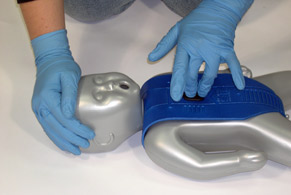CPR-B teaches parents, grandparents, babysitters or
childcare workers the CPR and choking procedures for adults,
children and infants. CPR-B includes the importance of early
defibrillation and how to use an AED. CPR-B certification is
included in Emergency First Aid.
Prerequisite: None.
Instruction & certification: Current
Lifesaving Instructors or First Aid Instructors teach and certify
candidates. The Lifesaving Society deems its certifications to be
"current" for 24 months from the certification date.
Candidate recognition: Certification card for
all CPR levels. (See Non-vocational awards below.)
Required reference material: Canadian First
Aid Manual or Canadian Lifesaving Manual
Recertification: CPR-A, -B and -C
recertification is approximately 3-4 hr.
at-a-glance
- Demonstrate one-rescuer adult, child, and infant
cardiopulmonary resuscitation on a manikin, and how to use an
AED.
- Simulate the treatment of:
- a conscious adult or child with an obstructed airway
- complications: a pregnant woman and person who is obese
- Demonstrate the treatment of a conscious infant with an
obstructed airway on a manikin.
- Simulate the treatment of an unconscious adult, child, or
infant with an obstructed airway.
:::

Non-vocational awards
Include Swim Program, Canadian Swim Patrol (Rookie, Ranger,
Star), Basic First Aid, CPR A, B and C, Boat Rescue and Lifesaving
Fitness.
Affiliates issue all non-vocational awards directly to
candidates. Affiliates order the awards from the Society ahead of
time for presentation to successful candidates at the
evaluation.
The Lifesaving Society does not require a copy of the test
sheets for these levels.
Only Swim for Life® licensees may offer swim program
awards.